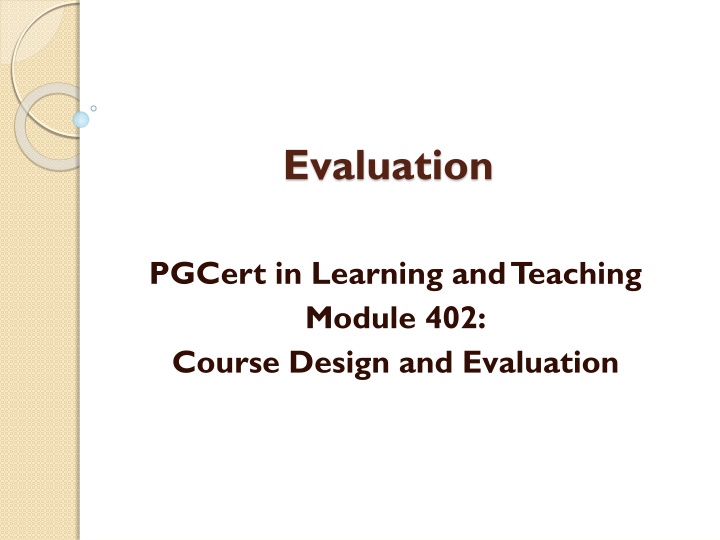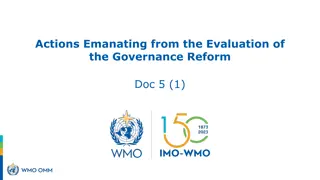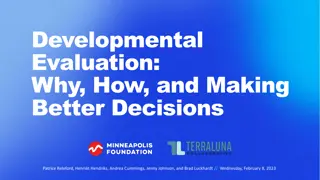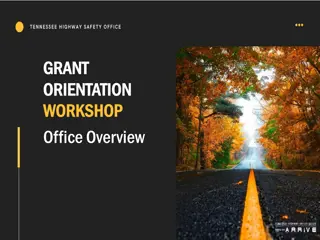
Effective Evaluation Strategies in Learning and Teaching
Explore the process of evaluation in learning and teaching, including key points on student feedback, sources of evidence, and the importance of finding out more about student learning and teaching practices.
Download Presentation

Please find below an Image/Link to download the presentation.
The content on the website is provided AS IS for your information and personal use only. It may not be sold, licensed, or shared on other websites without obtaining consent from the author. If you encounter any issues during the download, it is possible that the publisher has removed the file from their server.
You are allowed to download the files provided on this website for personal or commercial use, subject to the condition that they are used lawfully. All files are the property of their respective owners.
The content on the website is provided AS IS for your information and personal use only. It may not be sold, licensed, or shared on other websites without obtaining consent from the author.
E N D
Presentation Transcript
Evaluation PGCert in Learning and Teaching Module 402: Course Design and Evaluation
Learning outcome Design effective evaluation strategies through a critical comparison of alternative strategies Or What forms of evaluation occur in your module/ programme now What approaches are used in other programmes What are the strengths/weakness of your system In comparison with others and with a model What might you adapt to improve evaluation practice in your module/ programme
Definitions Evaluation is: A process whereby a teacher, group of students, or their institution, find out, on the basis of their own perceptions, the overall quality of a programme, a particular course, or a teacher generally part of a formative process aimed at improving standards. Who Does what Why heacademy.ac.uk
Some key points Evaluation is more than student feedback But includes student feedback as a key source of evidence Here student feedback means feedback from students, about the programme, not feedback to students, about their work USA uses assessment to mean evaluation (UK) In general: Module evaluation tends to focus on student feedback Programme evaluation should have a wider more systematic approach You need to consider both levels in the assignment
Why find out more To find out about: Student learning Student difficulties Your teaching Strengths and weaknesses To engage students in their learning experience To provide evidence for: Your professionalism Quality control Organisational requirement Morss & Murray 2005
Why find out more What systems are there in your area for finding out about teaching, learning, student perceptions for your module Articulating your own (departmental) practice and listening to what others do is one step toward the assignment's critical comparison
Evaluation: The system Evaluation is more than student feedback There are many sources of information It can be thought of as a process Circular Usually driven by the institution Often applied differently in different departments Regularly applied to modules & programmes as well as to individual lecturers
The evaluation cycle 1 Decide: Reasons, purpose, level 6 Implement changes Report 2 Devise: Strategy - method(s), timing 5 Agree action Notify students, staff 3 Gather: Data, feedback 4 Analyse & interpret HEAcademy.ac.uk
1 Purpose of Evaluation Main purpose: enhance students experience of learning and teaching contribute to monitoring and review of quality and standards Also contributes to: effectiveness of course design and delivery dialogue with students students reflecting on their experiences enhancing the teaching and learning process identifying good practice measuring student satisfaction which can lead to marketing (recent development) staff development heacademy.ac.uk Question: Which of these predominate in your area
Level of the evaluation - where is the focus? Individual session(s) delivery, learning Module delivery, administration/resources Programme delivery, integration, overall University services Critical questions In your area: Which of these is evaluated as a rule How is it done and who causes it to be done Who gets any value
2 Devise the strategy Sources of information, and timing Sources of information: Students: Feedback Staff student liaison committee Performance in assessment National Student Survey increasingly important Self, peers, mentors, external examiners, reviews External sources: Employers and Professional bodies Other universities courses League tables Question: Which of these has been useful or impacted on your work
When to evaluate - timing To benefit current students: After an individual session Within a module - for immediate feedback on comprehension, interest, perception of relevance, workload To benefit future students: At the end of a module - to gauge whether learning outcomes have been met, and potential changes for the next time At the end of the year? Every 5 years? (UK systems) Which of these are you aware of/ benefit from?
3 Gather: How and what process? Method: Questionnaires (hard copy and electronic) Focus group various approaches Student assessment results Peer review CATs - Classroom Assessment Techniques Any other way? Process: Who will collect this data When - in a session, after it, What format paper forms, summary report, electronic??
Questionnaires: rationale Decisions to be made: Quantitative for comparison between modules/teachers and over time Qualitative to allow more in-depth and tailored responses Open or closed questions Hard copy or VLE/ web based (Survey Monkey) Repeating questions from previous years (for comparison) or changing the questions to give new insights Aligning questions to the NSS
Questionnaires: design Bear in mind: Is the purpose clearly stated Are the questions unambiguous. Are the questions answerable Are they phrased in a way that is easily understood Is there a mix of open and closed questions How many questions are being asked Is the Likert scale being used appropriately? (adapted from Brennan and Williams 2004) NB questions themselves are often not researched or evaluated See the resource in vital: Questions to consider when critiquing the evaluation questionnaires
4 Analyse - interpret How are paper responses collated put into electronic format? How analysed? How are qualitative comments analysed and reported? Who does all this? Question: What happens in your area?
5 Agree action What happens to the results of the evaluation? How do the students or providers of feedback know what will be changed for next time? Where is the commitment to change? Who is responsible for ensuring that change happens? Question: In your area: How does this happen? Does it work ?
6 Implement the changes Change the delivery Update the curriculum Provide opportunities for staff development Clarify expectations look at the student handbook! Update resources Tell the Students!! Question: Who does all this in your area?
How can we get students to respond and take it seriously? Demonstrate the effect Make time in sessions Require attendance/ completion Make it easy (e.g. Vital) Don t overload - too many questions, too often Vary evaluation methods Written comments rather than tick boxes? Give examples of constructive feedback Establish ground rules Give feedback e.g. on notice boards, Vital Question: Which of these is used in your area Which could be?
Coming soon.. University purchase of Evasys Will change evaluation practice Increasing responsiveness to NSS Becoming more thoughtful, less reactive?
NSS Questions: areas & e.gs. The teaching on my course Staff have made the subject interesting Assessment and Feedback Feedback on my work has helped me clarify things I did not understand Academic support I have received sufficient advice and support with my studies Organisation & Management The course is well organised and is running smoothly Learning Resources The library resources and services are good enough for my needs Personal development I feel confident in tackling unfamiliar problems Overall satisfaction Overall, I am satisfied with the quality of the course
Possible additions to NSS Academic challenge/reflective and integrative learning, e.g. My course has challenged me to achieve my best The learning community/ collaborative learning I have not been encouraged to talk about academic ideas with other students Student voice Staff appear to value the course feedback given by students I have been encouraged to use technology to enhance my learning HEFCE 2014
Alternatives UK variation on National Survey of Student Engagement; NSSE (US & Aus) Gibbs (2012): NSSE provides a more valid predictor of student gains than does NSS See HEA website Engagement for enhancement & Institutional case studies (NSSE pilot)
What other processes contribute to evaluation? Recap: the university has other processes beyond student feedback to evaluate the quality of programmes Annual Subject Review report Internal Periodic Review Professional Body Review External Examiners Institutional Audit QAA (November 2015) Required responses to NSS see Student Experience Committees Have you experience of these Have you seen value from them
Learning outcome Design effective evaluation strategies through a critical comparison of alternative strategies Or What forms of evaluation occur in your module/ programme now What approaches are used in other programmes What are the strengths/weakness of your system In comparison with others and with a model What might you adapt to improve evaluation practice in your module/ programme
Questions In your department/programme/team how effectively are evaluation processes leading to change Consider one major change that you could make to evaluation in your area What aspects of your evaluation systems would you recommend to others Use the questions on the slides as prompts for your assignment
Resources Angelo, T., & Cross, P. (1993) Classroom Assessment Techniques: A Handbook for College Teachers, 2nd edition Brennan, J & Williams, R.(2004) Collecting and using student feedback www.heacademy.ac.uk/ First words on Evaluation- Oxford Brookes University www.brookes.ac.uk/services/ocsd/firstwords/ Haugen, L, (1999) Classroom Assessment Techniques (CATs), Iowa State University http://www.celt.iastate.edu/teaching/cat.html HEFCE (2014) NSS Review https://www.hefce.ac.uk/pubs/rereports/Year/2014/nssreview/Title,92164,en.html Macdonald, R. (2006) The use of evaluation to improve practice in learning and teaching. Innovations in Education and Teaching International Vol. 43, No. 1, February 2006, pp. 3 13 Morss, K., & Murray, R. (2005) Teaching at University: A Guide for Postgraduates and Researchers Shevlin M., Banyard P., Davies M., & Griffiths M. (2000) The Validity of Student Evaluation of Teaching in Higher Education: love me, love my lectures? Assessment & Evaluation in Higher Education, Volume 25, Number 4, 1 December 2000, pp. 397-405(9)
Why find out more Demonstrating evidence based practice Improving student experience Improving your experience! Raising profile (yours) Supporting change
One-Minute Paper Course Knowledge and Skills During last few minutes of class period, ask students to use a half-sheet of paper and write "Most important thing I learned today and what I understood least." Review before next class meeting and use to clarify, correct, or elaborate. Haugen 1999 (from Angelo & Cross 1993)
Muddiest Point Course Knowledge and Skills Similar to One-Minute Paper but only ask students to describe what they didn't understand and what they think might help. Same as One-Minute Paper. If many had the same problem, try another approach. Haugen 1999 (from Angelo & Cross 1993)
How can you gather evidence And what counts as evidence Your own evidence: Teaching diary: your record, responses, reflections, rationales, observation of students, informal notes (e.g. on ppt slides) Video or audio taping Checklist Learning log Goals and achievements (may be shared)
Various Teaching methods Questionnaires Standardised Designed by you for specific purposes Input from students Focus groups Run by neutral person Staff- student liaison committees Peer review Peer observation; mentor; supervisor





















